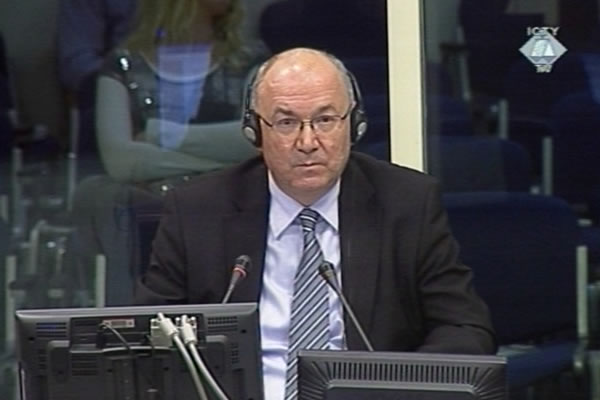Home
MATE GRANIC IN DEFENSE OF MARKAC
Former Croatian foreign minister claims that Tudjman’s authorities engaged in various diplomatic efforts to get the rebel Serb leaders from Krajina to the negotiating table and to solve problems peacefully. The Serb leadership kept refusing the initiatives and at the same time indoctrinated their compatriots, telling them not to accept the Croatian state. According to the witness, this culminated in Operation Storm and ‘the departure of those people’
 Mate Granić, svjedok odbrane Mladena Markača
Mate Granić, svjedok odbrane Mladena Markača After a protected witness whose evidence was heard in closed session, police general Mladen Markac called his second witness, former Croatian foreign minister Mate Granic. The statement Granic gave to the defense in May 2009 was admitted into evidence. Granic was examined in chief by defense counsel Goran Mikulicic, who focused primarily on the events that preceded Operation Storm in the summer of 1995. Generals Gotovina, Cermak and Markac are on trial for crimes perpetrated in Operation Storm.
Granic first recounted how he, a well-respected medical doctor and dean of the Medical School, first became deputy prime minister in 1991 and then two years later the leading Croatian negotiator and foreign minister. The witness said that the Croatian policy in the 1990s was peaceful, stressing the constant efforts to reach solutions by diplomacy and not war. One such example, Granic contends, was exerting pressure on the Bosnian Croat leadership headed by Mate Boban to make them refrain from fighting with the Muslims, resulting in the Izetbegovic-Tudjman agreement in September 1993.
In his evidence today, Granic insisted that the leadership in Zagreb had friendly relations with Alija Izetbegovic’s government, striving to accommodate it whenever it could. In 1994, Croatia wanted to take military measures to prevent attacks on Bihac from the territory of the so-called Republika Srpska Krajina. However, the US administration didn’t green-light this operation. It was only in the summer of 1995 that it became possible for the operation to be launched, and the Croatian Army could assist the BH Army and the HVO in operations around Glamoc and Grahovo which had an indirect impact on the situation around Bihac.
About 390,000 Croats and other non-Serbs were expelled from parts of Croatia occupied in 1991-1995, Granic said. Thousands were killed. UNPROFOR, deployed in Croatia in 1992, could do nothing to prevent the crimes against the non-Serbs in Krajina. UNPROFOR didn’t do much to disarm insurgent Serbs, Granic added. According to him, the UN mission in Croatia actually ‘freeze the status quo achieved by ethnic cleansing’ in Krajina.
Granic argued that all Croatian diplomatic efforts were in vain, because the Krajina authorities headed by Martic were not interested in coming to an agreement with the Croats, and violated the agreements that had already been signed. For example, Granic stated, the agreement to put the Zagreb-Belgrade highway back into operation and to use the gas pipeline going through the Serb-controlled areas was not implemented. In May 1995, because the Serb leadership reneged on its commitments, the Croatian side launched Operation Flash, which did not result in any serious human rights violations, as Granic contended.
Martic didn’t come to his senses and sit down at the negotiating table: his response was the rocket attack on Zagreb and other Croatian towns, the witness recounted. According to Granic, the Croatian authorities nevertheless were adamant that the Serbs from Krajina were Croatian citizens with equal rights; they were to be given the highest level of human rights, as guaranteed by the Croatian Constitution. However, Granic continued, the local Serbs were exposed to ‘constant indoctrination’ by their leaders, who kept telling them not to accept the Croatian state. This culminated with Operation Storm and ‘the departure of those people’, Granic concluded.
The evidence of the former Croatian diplomat continues tomorrow. Granic is expected to answer questions more directly related to the allegations in the indictment.
Linked Reports
- Case : Gotovina et al. - "Operation Storm"
- 2009-11-11 CROATIA WAS DEFENDED FROM BH
- 2009-11-10 IVAN CERMAK’S DEFENSE RESTS ITS CASE
- 2009-11-10 CROATIA WAS DEFENDED FROM BH
- 2009-11-18 MATE GRANIC: ‘CROATIA DIDN’T DO ETHNIC CLEANSING’
- 2009-11-19 SERBIAN COMPLAINTS AND INTERNATIONAL CRITICISM WERE ‘EXAGGERATED’
- 2009-11-20 TWO SIDES OF TUDJMAN’S PERSONALITY
